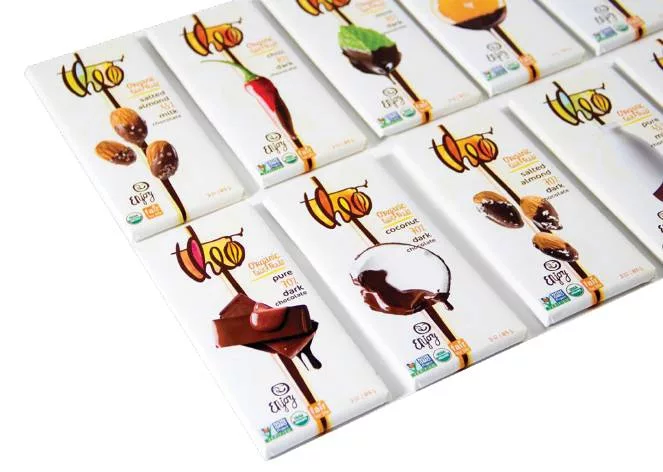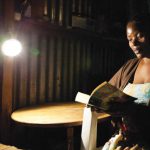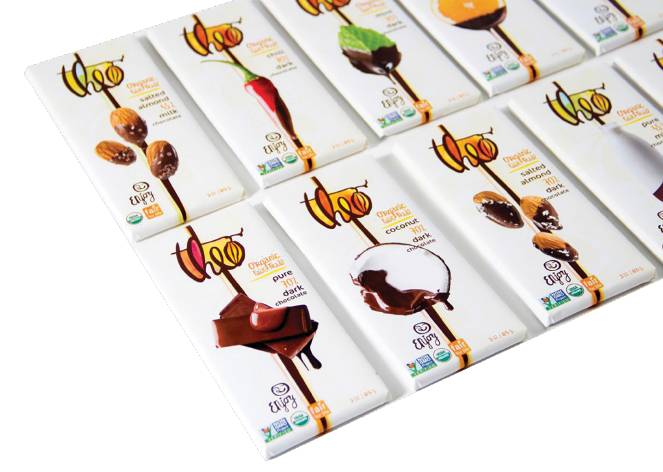
Location: Seattle, Washington
Products: Classic chocolate bar line, caramels, seasonal ganache confections, specialty products (drinking chocolate and pairing kits), classic candy (peanut butter cups)
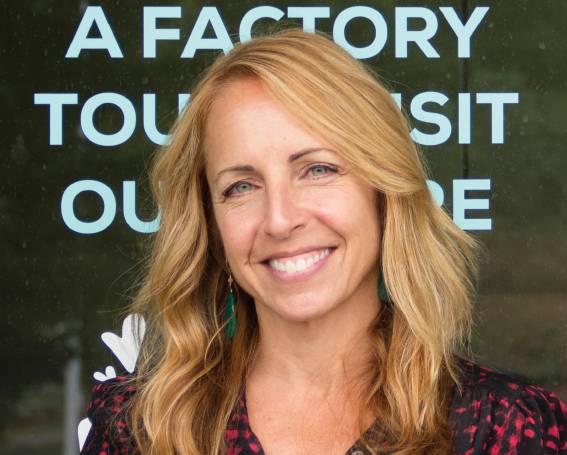
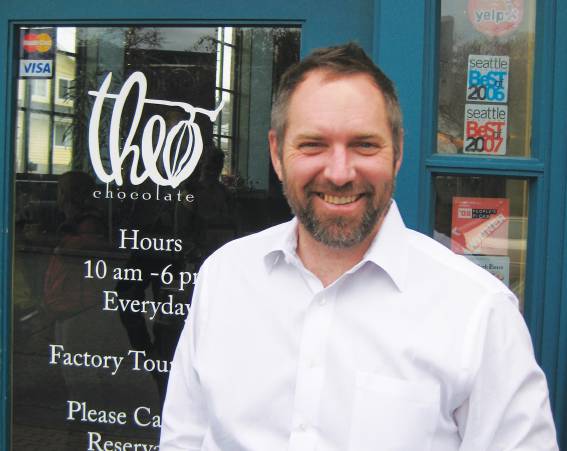
THE GOODS
• First bean-to-bar maker of Organic, Fair Trade, Fair for Life, and Non-GMO certified chocolate in North America.
• Unique business model that pays farmers a premium based on quality that is above and beyond Fair Trade pricing standards.
• All products are certified Non-GMO by the Non-GMO Project.
• Deliberately avoids commodities linked to deforestation (e.g., palm oil).
• Provides technical assistance and resources to farmers to enable better yield and production
(e.g., fermentation and drying).
• Encourages full transparency and traceability along the entire supply chain.
• Works alongside farmers and like-minded partners to help achieve economic stability, increase household incomes, and improve access to vital services in communities where beans are purchased.
• Actively educates more than 60,000 visitors annually on fair trade principles, organic agriculture, and social responsibility via the company’s public factory tours.

Starting a chocolate company seems like both a dream come true and also a risky endeavor – can you tell us about your decision to start Theo Chocolate and what finally convinced you to really go for it?
Joe Whinney: Though there were certainly risks involved, founding Theo Chocolate has absolutely been the best professional decision I’ve ever made. By the early 2000s, I’d been working with chocolate makers in the US for around ten years, helping them source organic and Fair Trade chocolate from farms across Central America.
As commodity prices rose and the market continued to shift, it became clear that having a wholly owned manufacturing facility would be critical if I wanted to continue paying farmers fair prices. Because I wasn’t willing to compromise the Fair Trade market I’d helped to establish, I set out to find a factory and a team of like-minded individuals who wanted to create the best organic, ethically sourced chocolate in the world.
With this mission in mind, I moved out to Seattle with Theo co-founder Debra Music in 2004. We spent a couple years assembling a team and developing our brand, business plan, and facilities before opening up shop in 2006. Theo Chocolate was the first – and at that time, only – bean-to-bar maker of Organic, Fair Trade, Fair for Life, and Non-GMO Project certified chocolate in North America.
Despite some challenges along the way, we’ve been creating amazing chocolate from the purest ingredients ever since.
What inspired this approach to making chocolate?
JW: My interest in chocolate began in earnest when I started volunteering with a conservation group doing work in Mayan communities. After spending time in many beautiful villages across Central America and, later, in Africa, I fell in love with the land and the people farming there. For all the positives, though, there were real issues about the way farmers were treated. The systems in place tended to exploit workers and promote poor, dehumanizing treatment. This was back in the 1980s, when organic cocoa farming wasn’t as defined of a practice as it is today.
Since then, I’ve spent a lot of time and effort to establish export and trade protocols that champion organic agriculture and Fair Trade principles. After several years of hard work, I’m proud to have had a role in bringing the first supplies of organic cocoa beans into the United States in 1990.
By the time Debra and I founded Theo in 2006, there was no question as to how our company would do business. Our inaugural production run was the first organic, Fair Trade chocolate made right here in the US, where our entire manufacturing operation is based. We were founded on a mission to deliver chocolate of the highest quality while improving livelihoods in farm communities where our cocoa is grown and harvested. We’re proud to have never wavered from that commitment.
“We’re seeing the rise of conscious consumerism, where people seek out companies that act in alignment with their own personal values.”
How do you identify the farmer groups and grower cooperatives that you work with and how do you develop and maintain these relationships?
JW: Using quality cocoa beans is the single most important step in producing delicious chocolate. We look all around the world for the best cocoa beans that will serve as the basis for our products. Many variables can affect the quality of a cocoa bean – things like humidity, soil, ecosystem biodiversity, and access to sunlight.
Some of these variables are controllable, but others aren’t. When we think about selecting our suppliers, then, we need to begin by identifying a bioregion and climate that lend themselves to growing and fermenting chocolate. Some of our sourcing regions are well-known and conventional within the industry, but others – like the Democratic Republic of Congo – are products of our own research and professional networks.
Once we zero-in on a particular region, we build partnerships with certified organic and Fair Trade producer groups that are comprised of local smallholder farmers. Because Theo requires ingredients of the highest quality, we are invested in making sure our suppliers understand how to grade beans in the same way we do. Not only that, our farmer co-op and export partners must demonstrate full transparency throughout their businesses so that we can ensure our payments are going toward improving farmer livelihoods.
Once we select producer groups, we personally meet with farmers to explain our pricing model, which provides significant price premiums for cocoa of a superior quality. Through our farmer education programs, we’re able to teach our suppliers how to grow and harvest beans that will earn them the highest premiums. It’s a way of doing business that is completely separated from the global commodity price of chocolate, meaning that – by doing business with Theo – farmers can be assured they won’t receive a lower price for their chocolate based on circumstances out of their control (such as political unrest).
It’s important to us that we maintain close working relationships with our suppliers, which is why members of our team personally travel to origin sites regularly to visit and learn how operations are changing and progressing.
Of all of the things that you do to be more sustainable or conscious, what is most important to you or what are you most proud of?
JW: Our recent work in the Democratic Republic of Congo – where we now source more than 50 percent of our cocoa beans – has been immensely rewarding. It’s a complex and challenging region to do business in, but we’ve been able to create a tremendous amount of good through our work with the Eastern Congo Initiative (ECI). By training Congolese farmers to grow high-quality Organic and Fair Trade certified cocoa, Theo and ECI are helping to economically empower communities – an act that rallies against poverty and violence in the region and sets individuals on a path towards a better future. Because cocoa is a fast-growing, high-yield crop, it requires minimal re-planting and can serve as a major source of income for women and families in the region. By creating business opportunities in the regions where we purchase beans, we’re seeing a positive ripple effect that’s included improvements in food security and access to healthcare.
We’re extremely proud to call eastern Congo our primary cocoa sourcing region. Our activities in the region have been instrumental in supporting Theo’s mission to create delicious products while working to improve livelihoods and protect the environment in farm and factory communities alike. Last year alone, we imported around 600 metric tons of Congolese chocolate.
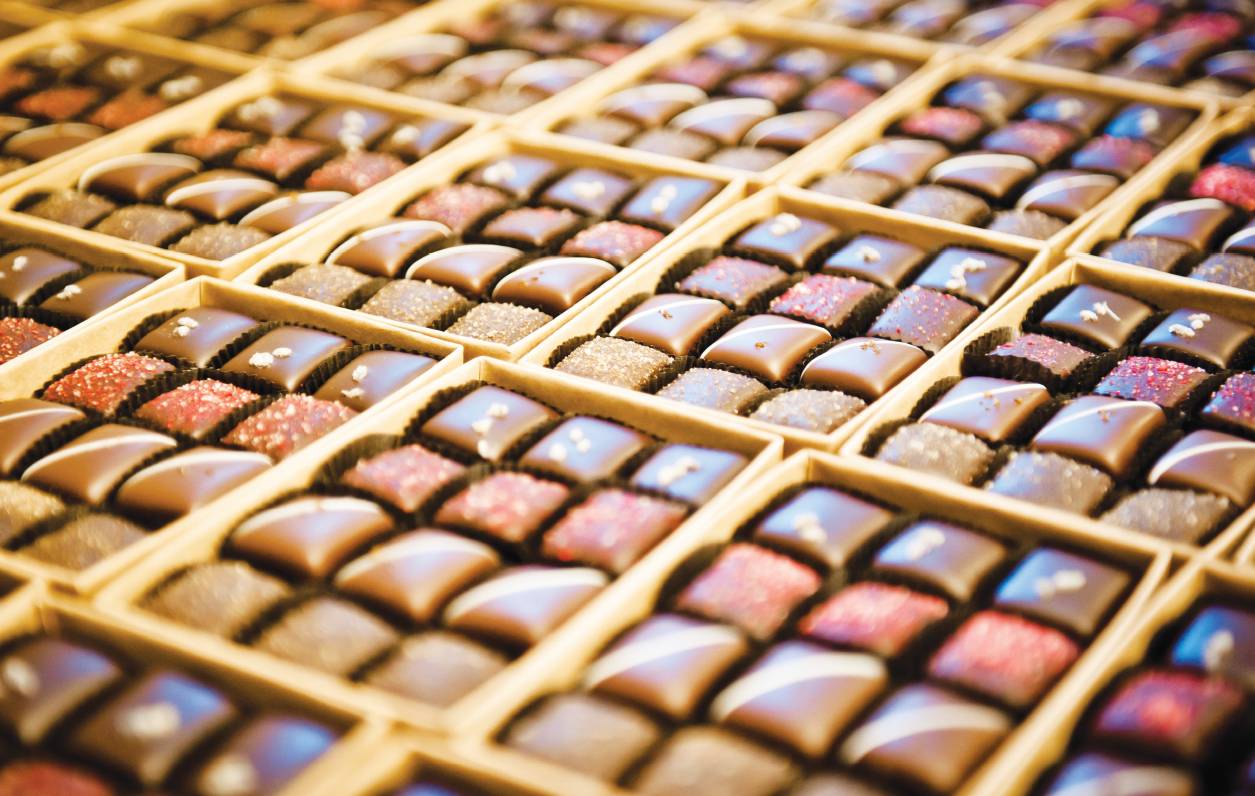
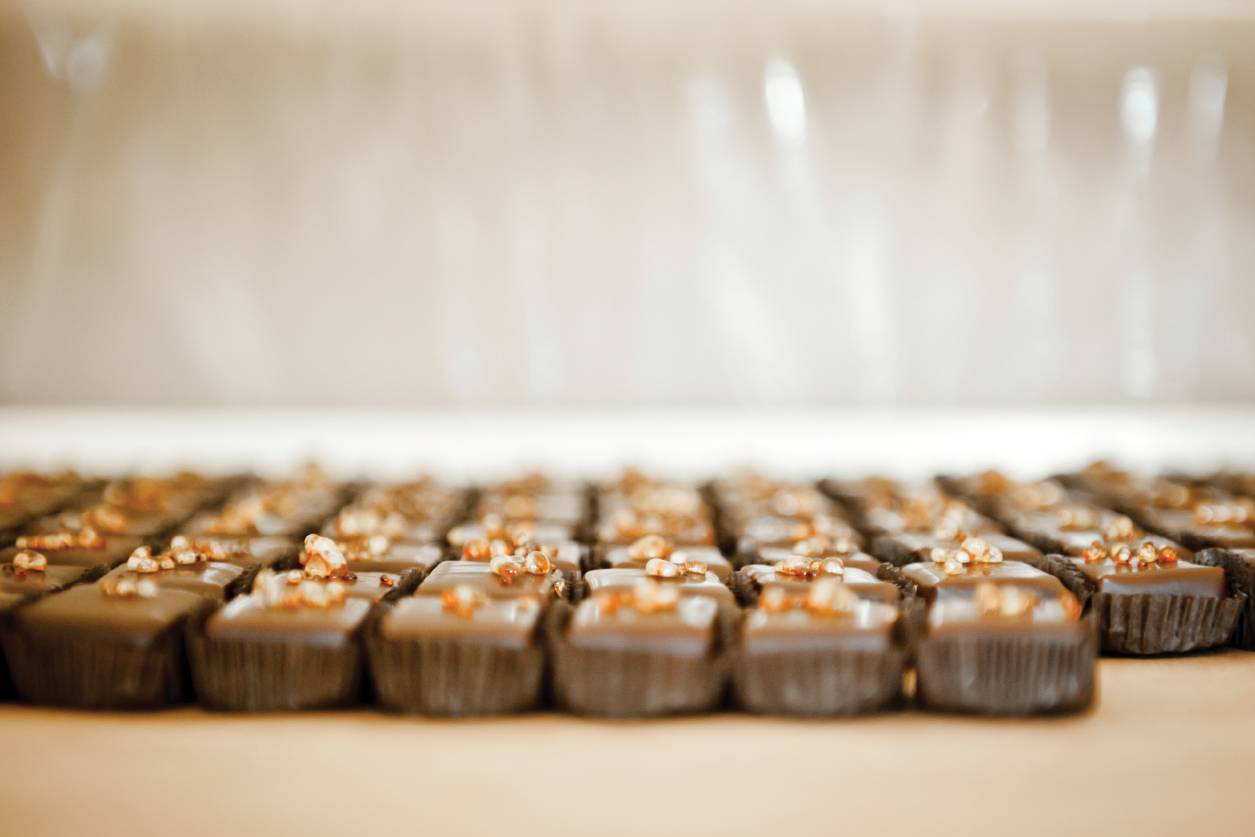
“We’re proof that it’s possible to run a successful business that is firmly rooted in relationships and has a strong moral compass.”
As a chocolate producer, why is it important to operate sustainably and what is your greatest hope for the future of the chocolate industry?
JW: Aside from fundamentally being the right thing to do, operating sustainably ensures that Theo’s business is not controlled by speculation or spikes in the global commodity price of chocolate. Because we actively avoid cocoa grown on plantations created by deforestation, we run no risk of land degradation negatively impacting the quality of our products. If we’re defining sustainability as protecting the availability of our operating environment for generations to come, we’ve gone to great lengths to ensure we’re creating enduring change and improvements in our sourcing regions and manufacturing site.
My greatest hope for the chocolate industry is for quick and clean adoption of business practices that support workers across the entire supply chain. Theo is founded on the belief that there is a common thread that binds us, from the cocoa farmer to the chocolate lover, and we’re devoted to making our world a better place. We’d like to see that belief adopted more widely.
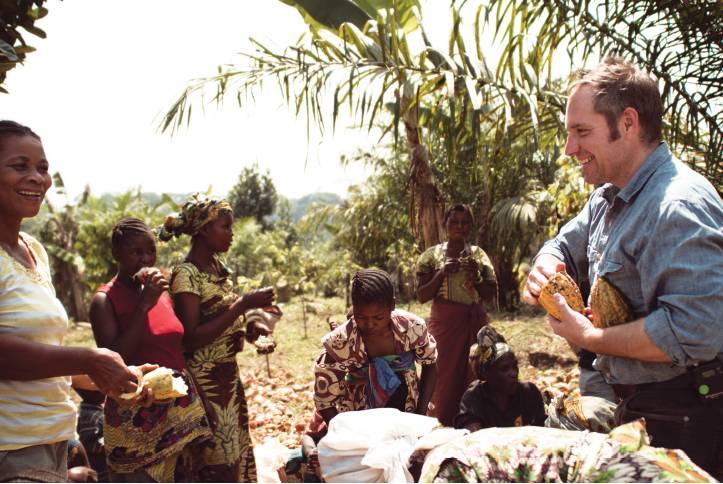
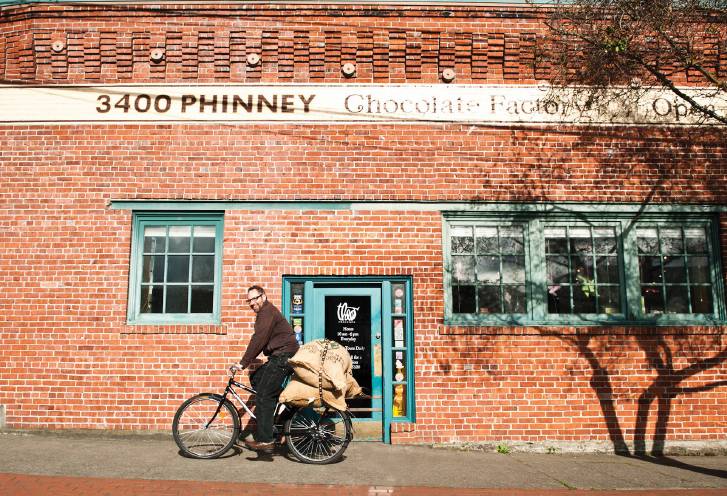
How do you think operating consciously benefits your bottom line?
Debra Music: I think we’re seeing the rise of conscious consumerism, where people seek out companies that act in alignment with their own personal values. There is still a great amount of work to be done before this type of behavior becomes commonplace for mainstream consumers, but we’ve had the pleasure of meeting and working with extremely passionate customers who understand the importance of designations like Fair Trade and Organic.
We’ve had a tremendous amount of success over the nine years that we’ve been in business, thanks in large part to our dedicated partners in the organic and natural food retail marketplace. We’re proof that it’s possible to run a successful business that is firmly rooted in relationships and has a strong moral compass.
We’re firm believers in quality, and sustainability and ethical sourcing are not by themselves substitutes for a delicious end product. Instead, these practices serve as guiding principles that, by their very nature, drive quality. If we didn’t believe our products provided the best chocolate experience available anywhere, no amount of activism would keep us in business. I think people recognize and respond to our commitment to quality across the board, with respect to both taste and social responsibility.
What insights or advice do you have for other mission-driven entrepreneurs?
JW: Don’t be discouraged if you aren’t able to bring about meaningful change overnight. We’ve had to work hard for years to begin making a real difference. For that reason, you have to also really love what you’re doing.
At Theo, we like to say that our company is rooted in passion, grounded in beliefs, and put into practice every day. My advice would be to find the venture that, for you, contains that capacity for passion, belief, and day-today dedication. From there, stick with it while not being afraid to adapt in order to accommodate new and innovative ideas and a changing marketplace.
Where would you like to see Theo Chocolate go from here?
DM: We’d like to continue to see our business grow so that high-quality organic, Fair Trade, non-GMO chocolate is accessible and affordable to chocolate lovers everywhere. We’re not trying to create an exclusivity around our brand – we want to include everyone in our mission and vision because the belief that we are all connected is at the very heart of our business. We want to do everything we can to reach more consumers and inspire them to learn not only about chocolate, but about proper environmental stewardship and, ultimately, about the true cost of food. The way to a sustainable future for all of us is educated consumers voting with their dollars.
